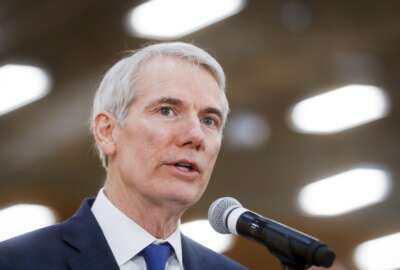Senators reintroduce bill to end shutdowns, bring awareness to one potentially coming
In today's Federal Newscast, two Senators say they're reintroducing their bill now to bring attention to the upcoming fiscal year deadline.
To listen to the Federal Newscast on your phone or mobile device, subscribe in PodcastOne or Apple Podcasts. The best listening experience on desktop can be found using Chrome, Firefox or Safari.
- Sens. James Lankford (R-Okla.) and Maggie Hasson (D-N.H.) are again pitching their bill that would trigger an automatic continuing resolution should Congress fail to secure permanent government funding before the fiscal year deadline. They’re reintroducing the Prevent Government Shutdowns Act. The bill now has eight co-sponsors. Seven are Republicans. The legislation would also restrict congressional and White House travel until members and staff reach an agreement on a permanent funding solution. Lankford and Hassan said they’re reintroducing their bill now to bring attention to the upcoming fiscal year deadline. Congress has about two weeks to prevent a government shutdown before September 30.
- Congress renews a drive to overhaul the treatment of animals in federal test labs. Veterans Affairs, the National Institute of Health, the Food and Drug Administration and the Defense Department already have policies under which lab animals can retire — be made available for adoption by homes or sanctuaries — rather than euthanized. Now a House bill, dating from 2019 but reintroduced yesterday and called the After Act, would make that policy apply governmentwide. Sponsors are Reps. Brendan Boyle (D-Penn.) and Nancy Mace (R-S.C.). There’s already a Senate version.
- The IRS gets help to shrink the tax gap if a bill moves forward in Congress. The Tax Gap Reform and IRS Enforcement Act would require the agency to create a fellowship program, aimed at recruiting mid-career tax professionals from the private sector. Fellows would help the agency with some of its most complex audits, and help shrink a growing gap between what taxpayers owe and what the IRS collects. Senate Finance Committee Ranking Member Mike Crapo (R-Idaho) and House Ways and Means Committee Ranking Member Kevin Brady (R-Texas) introduced the bill. It’s a counter-offer to the Biden’s administration’s plan to increase the IRS budget by $80 billion over the next 10 years.
- Lawmakers are eyeing another big funding boost for the Cybersecurity and Infrastructure Security Agency. The House Homeland Security Committee approved $865 million for CISA as part of an amendment to the forthcoming reconciliation bill. The additional funds include $400 million to implement President Biden’s executive order on cybersecurity, as well as $100 million for workforce development and education. However, the ultimate fate of the reconciliation bill is murky in both the House and the Senate.
- The General Services Administration and CISA are bringing back familiar faces in leadership roles. CISA said Kiersten Todt will be its new chief of staff. In that role, Todt, who was the executive director of President Barack Obama’s Commission on Enhancing National Cybersecurity, will lead the planning, allocation of resources and development of long-range objectives, and provide strategic vision and direction for the workforce. Meanwhile, GSA is bringing back Waldo Jaquith, a former senior innovation specialist at 18F, to be senior advisor to Administrator Robyn Carnahan.
- Rep. Jody Hice (R-Ga.) is still looking for more information on the federal employees detailed to the southern border. The Office of Personnel Management and Department of Health and Human Services issued a joint call back in March for federal employees to serve on the southern border. Hice said over 1,300 federal employees served as volunteers during the height of the detail operation in May. Nearly 200 were at the southern border as of late August. Hice said he’s concerned about the workload those employees left behind while they were on their detail assignments, and how their home agencies are filling in the gaps.
- Assistant U.S. attorneys said they’re missing out on the salary boosts that other Justice Department lawyers receive. The National Association of Assistant Attorneys is calling for pay reform for some of its members. Trial attorneys at the Justice Department’s litigation division receive salaries under the General Schedule. But assistant U.S. attorneys are paid under a different salary structure. The association wants the Justice Department to correct what it said are longstanding pay inequities between the two groups.
- The Pentagon’s inspector general said there are signs that DoD’s health system has been improperly paying medical providers for administering COVID-19 vaccines. In a management alert to the Defense Health Agency, the IG said it found signs that DoD’s TRICARE contractors don’t have proper internal controls over claims for COVID shots. Among the problems: payments being made twice for the same patient, patients being charged co-pays when the shots are supposed to be free, and providers getting paid for administering more than two doses to the same patient.
- The Army is mandating that all of its uniformed members get vaccinated. All active duty soldiers must be fully vaccinated by December 15, according to the Army surgeon general. Army reserve and National Guard members have until the end of next June to get their shots. The service said if soldiers do not comply with the order then they will be counseled by a professional. If a soldier continues to refuse the shot then disciplinary actions will be taken, including ones that could be career ending. The Air Force is working on a shorter timeline and requiring its service members to get the shots by November 2. The Navy has still yet to release its implementation plan. (Federal News Network)
- U.S. Cyber Command is turning its attention toward ransomware. Its commander, Gen. Paul Nakasone, says CYBERCOM is planning to “surge” resources toward the problem — saying it’s increasingly a national security issue and not just a criminal matter. Nakasone told the Associated Press the focus will be on sharing information about cyber attacks, and publicly linking them to countries when they’re backed by those nations’ governments. (Federal News Network)
- The Federal Communications Commission is restocking a public-private cybersecurity board, with a big focus on wireless network security. The FCC’s Communications Security, Reliability, and Interoperability Council is coming back to focus on fifth-generation wireless network security. Acting FCC Chairwoman Jessica Rosenworcel announced the appointment of 50 members to the council. She said the body will include more participation from “the public interest community,” after it had previously been criticized for giving private companies an outsized voice. The council will also be co-led by the Cybersecurity and Infrastructure Security Agency for the first time. The board’s initial meeting is scheduled for Sept. 22.
- The Army’s software factory’s first two cohorts are in place and a third one is on the way. The first group of soldiers and civilians the Army is training to be software developers are in place. And the second and third groups aren’t far behind. The Army’s software factory is bringing in 8 to 10 soldiers and civilians at a time with a goal of building a steady state force of about 200 developers. These soldiers and civilians would stay on for three years to learn software development skills and processes, and to develop applications before returning to their camps, posts or stations. The first five projects are focusing on applications for people, logistics and maintenance and tactical operations.
- The Postal Service in recent years awarded more than a quarter of its contract dollars through non-competitive awards. The USPS inspector general finds agency contracting officers didn’t follow requirements to publicize non-competitive awards worth more than $1 million, in a majority of cases the IG reviewed. USPS awarded more than $7 billion in contracts last year, and awarded $1.7 billion in non-competitive contracts that same year.
Copyright © 2024 Federal News Network. All rights reserved. This website is not intended for users located within the European Economic Area.
Eric White
Eric White is news anchor and Federal Drive producer at Federal News Network.
Follow @FEDERALNEWSCAST






